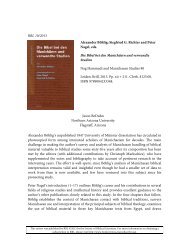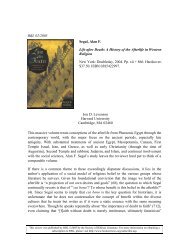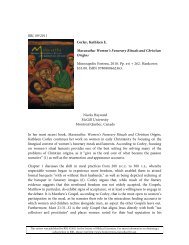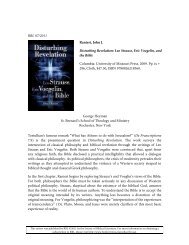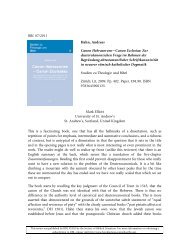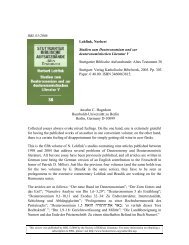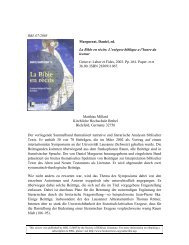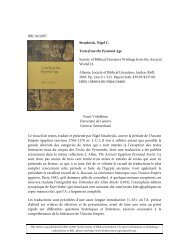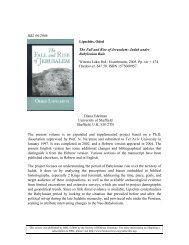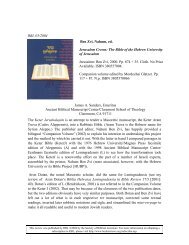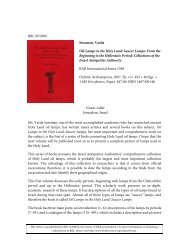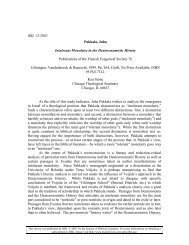Read the Review - Review of Biblical Literature
Read the Review - Review of Biblical Literature
Read the Review - Review of Biblical Literature
You also want an ePaper? Increase the reach of your titles
YUMPU automatically turns print PDFs into web optimized ePapers that Google loves.
Thus, after an introduction meant to quickly familiarize <strong>the</strong> reader with <strong>the</strong> overarching<br />
<strong>the</strong>mes <strong>of</strong> this Old Testament Theology and <strong>the</strong> issues postmodernity brings to a<br />
<strong>the</strong>ologian (13–50), part 1 <strong>of</strong> this volume (“Living with God,” 51–322) treats vertical<br />
aspects <strong>of</strong> how Israel ought to live before God. This should be, chiefly, a life defined by<br />
“submission and celebration,” punctuated by obedience, reverence, trust, servitude,<br />
giving, as well as sojourning with and <strong>the</strong> praising <strong>of</strong> God (53–190). Equally, it also<br />
should be a life <strong>of</strong> “prayer and thanksgiving” in which communication, protest, and plea<br />
mix with confidence, intercession, penitence, and thanksgiving (191–322).<br />
Part 2 (“Living with One Ano<strong>the</strong>r,” 323–582) engages horizontal relations <strong>of</strong> a social and<br />
political nature. Goldingay begins with <strong>the</strong> nucleus <strong>of</strong> all social life, “family and<br />
community,” in which he considers important topics <strong>of</strong> marriage, family, community<br />
(understood as a series <strong>of</strong> broader human relations beyond immediate kin and<br />
household), and servanthood (350–476). He <strong>the</strong>n moves on to wider human<br />
organizations, such as “city and nation” (477), where <strong>the</strong> focus is on <strong>the</strong> village, city,<br />
nation, and kingdom (477–582). Before tackling potentially sensitive topics <strong>of</strong> <strong>the</strong><br />
postmodern life, such as debates about what constitutes marriage or how gender roles<br />
should be envisioned by a modern family, Goldingay is careful to write down <strong>the</strong><br />
principles that guide him when discerning “what <strong>the</strong> First Testament has to say to <strong>the</strong> life<br />
<strong>of</strong> <strong>the</strong> third millennium world” (326–50). This is <strong>the</strong> closest Goldingay gets to laying<br />
down “ethical” principles in this volume (which some reviewers wrongly claim to<br />
comprise Goldingay’s “ethics”; he actually dislikes <strong>the</strong> rigidity <strong>the</strong> term implies).<br />
Part 3 (“Living with Oneself,” 583–831), <strong>the</strong> largest <strong>of</strong> <strong>the</strong> book’s parts, narrows in on <strong>the</strong><br />
self—not as an isolated entity but as one person living among and for o<strong>the</strong>rs and before<br />
God. In <strong>the</strong> first section <strong>of</strong> part 3 Goldingay nuances how various texts speak about<br />
“spirituality and character” in virtues such as godliness, holiness, and purity, as well as in<br />
cultivating a healthy relationship with life and death and with time and material<br />
possessions. In addition, he examines how one acquires wisdom or insight, how one is to<br />
use <strong>the</strong> mouth (words) when speaking, and how one is to suffer “well” (i.e., cope with,<br />
and retain most benefits from, suffering, 585–707), so that God’s people exhibit what God<br />
“looks for” (699–707). The final section in part 3 concerns “leaders and servants.” This<br />
gives Goldingay an opportune occasion for a discussion <strong>of</strong> governing and government<br />
with its inherent institutions in <strong>the</strong> First Testament, but with a critical eye to its<br />
limitations and propensity for abusing power (708–831).<br />
After filling up over 800 pages, Goldingay <strong>of</strong>fers a ra<strong>the</strong>r short conclusion meant to<br />
briefly recapture <strong>the</strong> vision tying all three volumes toge<strong>the</strong>r (832–39). Fur<strong>the</strong>r, it invites<br />
<strong>the</strong> reader to practice, not just retain in <strong>the</strong> mind, <strong>the</strong> principles that God intended for<br />
This review was published by RBL ©2012 by <strong>the</strong> Society <strong>of</strong> <strong>Biblical</strong> <strong>Literature</strong>. For more information on obtaining a<br />
subscription to RBL, please visit http://www.bookreviews.org/subscribe.asp.



